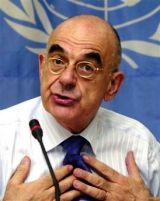UN watchdog agency threatens to pull auditors from Sudan
May 24, 2006 (UNITED NATIONS) — The U.N.’s internal watchdog agency threatened to withdraw its auditors from Sudan to protest restrictions by the top U.N. envoy that have prevented a thorough examination of the nearly $1 billion annual U.N. peacekeeping budget in the troubled African nation, according to a memo obtained by The Associated Press.
 The threat comes as the United Nations is planning to expand its Sudan operation and take over peacekeeping duties in conflict-wracked Darfur province. It also comes in the midst of a major U.N. reform effort and greater scrutiny of U.N. peacekeeping missions with a goal of more openness and accountability.
The threat comes as the United Nations is planning to expand its Sudan operation and take over peacekeeping duties in conflict-wracked Darfur province. It also comes in the midst of a major U.N. reform effort and greater scrutiny of U.N. peacekeeping missions with a goal of more openness and accountability.
Undersecretary-General Inga-Britt Ahlenius said in the e-mail memo that auditors from the Office of Internal Oversight Services, known as OIOS, “have not been able to fulfill any audits during the last three months” as a result of instructions from envoy Jan Pronk to his staff at the U.N. Mission in Sudan.
She said she had informed Secretary-General Kofi Annan on May 16 that she would be instructing the auditors to prepare to withdraw from the U.N. Mission in Sudan by May 31 because of Pronk’s interference.
Ahlenius said the auditors would return to Sudan only when she was satisfied that Pronk and his staff “will not act to infringe or interfere with OIOS’ mode of operations.”
Later Wednesday, U.N. spokesman Stephane Dujarric said that Pronk, Annan’s special representative in Sudan, was being recalled to New York and would discuss the issue with senior U.N. officials. As a result of some new steps Pronk has taken, OIOS has agreed not to withdraw its auditors for now, he said.
“We have been told by OIOS that they will not be withdrawing their auditors by May 31 and they will be holding discussions when Mr. Pronk is in New York next week,” Dujarric said. “We want to see this issue resolved quickly so that OIOS can carry out its valuable auditing work in Sudan.”
Undersecretary-General for Peacekeeping Jean-Marie Guehenno told AP on Tuesday that “there has to be trust between OIOS and the mission.”
“It’s very important … that the mission sees the auditors as a help, and I hope we will work out a good working relationship with the OIOS,” he said.
Bahaa Elkoussy, a spokesman for the U.N. Mission in Sudan, said Wednesday that Pronk “does not comment on internal memos.”
The U.N. Mission in Sudan currently has 10,500 troops, international police and civilians who are responsible for monitoring a January 2005 peace agreement that ended a 21-year civil war between Sudan’s mostly Muslim north and the Christian and animist south. But the mission is expected to undergo a dramatic expansion later this year when the U.N. takes over peacekeeping duties in Darfur from the African Union.
Pronk’s main reason for coming back to New York is to discuss “the future direction of the mission given the imminent massive increase in the mission’s workload as a result of the added planning for a U.N. mission in Darfur,” Dujarric said.
Pronk, a former Dutch minister, has been Annan’s special representative in Sudan since June 2004. He has played key roles in promoting north-south peace and getting the government and a key rebel group in Darfur to sign their recent peace deal as well as in highlighting the violence in Darfur where about 180,000 people have died – mostly through disease and hunger – and 2 million have fled their homes.
U.N. staffers in Sudan became distrustful of the auditors after two staffers involved in purchasing for the peacekeeping operation were put on paid leave in January pending completion of an investigation into fraud and mismanagement, according to recent U.N. documents seen by The Associated Press. Many felt their rights would not be protected during the audits and that prior judgments had been made about their work.
Pronk said in the documents that since his first instructions to staff in February he had urged cooperation with the auditors, but he said there were differences with the auditors on what staffers were required to do. In the February instructions, Pronk said staffers could demand questions in writing and get an agreed summary of audit interviews.
That caused problems with the auditors who wanted him to recall his instructions, but Ahlenius said that proved impossible. “As a matter of fact we have also met restrictions as to access to documents,” she said.
After Alenius sent her memo to the secretary-general last week threatening to withdraw the auditors, Pronk spoke to Guehenno and the chief OIOS auditor in Sudan, according to the documents seen by AP.
That led to a “Dear Colleagues” memo to staff on May 21 with new instructions, superseding all others.
It reiterated that under U.N. rules all staff must fully cooperate with OIOS, including providing access to documents and any explanations requested by the auditors. The auditors, in return, will make clear whether a staffer is being asked about an audit or an investigation and will allow staffers to correct and comment on draft audits and request “a mutually signed summary record of an interview,” Pronk said in the document.
“Transparency and accountability are essential to ensure that our member states, including the Sudan, will have full confidence in the way in which we implement our mandate,” Pronk wrote.
(ST/AP)
